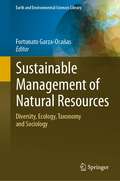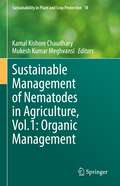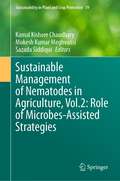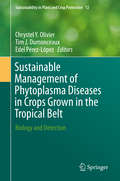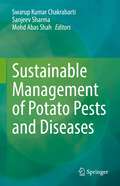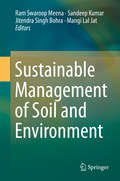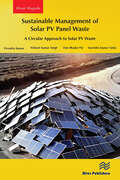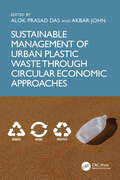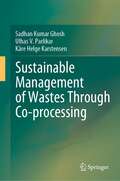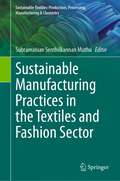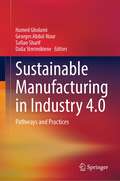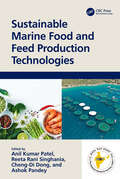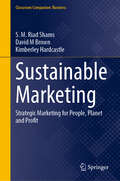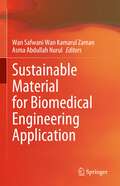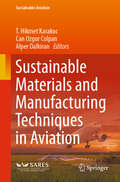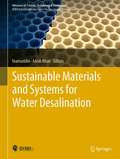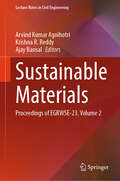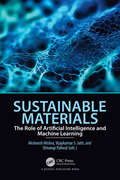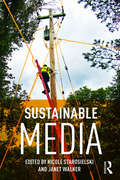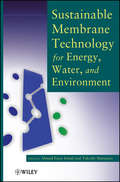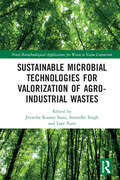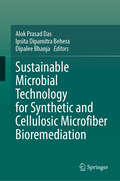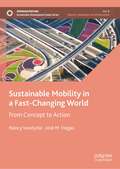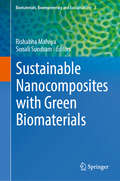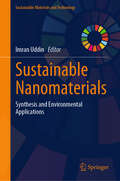- Table View
- List View
Sustainable Management of Natural Resources: Diversity, Ecology, Taxonomy and Sociology (Earth and Environmental Sciences Library)
by Fortunato Garza-OcañasClimate change and human activities are impacting the environment around the world and there is a great need to update our knowledge of natural resources in order to sustain the livelihoods of rural communities and urban dwellers. Educational tools help people to understand the ecology, and the management of natural resources and to participate in actions to protect the environment. This book has a multipurpose focus regarding biodiversity, management, and conservation of the natural resources as species are linked in nutritional webs in the ecosystems. Ecology, diversity, conservation, and management practices such as plant species, native fish, edible mushrooms, and woody species are important for improving people livelihoods and incomes. It is expected that readers will learn to apply similar multipurpose approaches to natural resources in other parts of the world when their environments are affected by climate change or human activities. This book introduces the importance of the sustainable management of natural resources to a wide audience, including policy decision makers, but also researchers.
Sustainable Management of Nematodes in Agriculture, Vol.1: Organic Management (Sustainability in Plant and Crop Protection #18)
by Kamal Kishore Chaudhary Mukesh Kumar MeghvansiThe present work covers many aspects of plant nematode management using organic strategies. These range from applications of latest understandings of fundamental concepts/mechanisms of nematode control, to modern tools and techniques used in efficacy evaluation. The Volume also includes some case studies/applied aspects of organic nematode pest management. Chemical and physical control measures used for nematode management have their own implications. Against this backdrop, organic management of plant nematodes appears as a more rational and sustainable approach. However, concise information on the current topic is scarce. This book is a sincere effort to bridge this void as we aim to provide the most updated, critical and in-depth knowledge synthesized by many experts working in the field of plant nematology, worldwide.
Sustainable Management of Nematodes in Agriculture, Vol.2: Role of Microbes-Assisted Strategies (Sustainability in Plant and Crop Protection #19)
by Kamal Kishore Chaudhary Sazada Siddiqui Mukesh Kumar MeghvansiThe Present Volume aims to summarize and update the information on utilization of soil microbes for management of plant parasitic nematodes. This volume will include more than 16 high quality chapters dealing with paradigms and mechanisms of nematode management using soil microbes, various soil microbes and their effectiveness in management of certain nematode diseases and regional case studies/success stories and lessons learnt for nematode management in various crops across the globe. Written for researchers, academicians, scientists, working in the field of Plant nematode management.
Sustainable Management of Phytoplasma Diseases in Crops Grown in the Tropical Belt: Biology and Detection (Sustainability in Plant and Crop Protection #12)
by Chrystel Y. Olivier Tim J. Dumonceaux Edel Pérez-LópezWith 160+ countries and islands, the tropical belt is the geographical region centered on the equator and limited by the tropics of Cancer and Capricorn. Tropical agricultural production is mostly for local consumption but cash crops are also present. Tropical agriculture is characterized by a significant lack of capital in research and agricultural systems and by a high prevalence of insect pests and diseases. Phytoplasma diseases are associated by bacteria-like pathogens living in plant sap and spread by sap-feeding insects. They are emerging diseases and are difficult to control, mostly because their epidemiology is not known. This book will focus on detection and prevention of phytoplasma diseases in field and horticultural crops grown in the tropical belt. The book will review current prevention methods used in small and large-scale farms, and present research results aiming at developing sustainable management of phytoplasma diseases in the tropics.
Sustainable Management of Potato Pests and Diseases
by Swarup Kumar Chakrabarti Sanjeev Sharma Mohd Abas ShahThis book covers the important diseases and pests of potato which are of global significance. The pests and diseases in potato lead to huge economic losses by reducing the yield and quality of the produce. This book describes major pests and diseases in detail with particular emphasis on the latest developments with respect to their biology, ecology, and management. It highlights the importance of virus infection for seed potato production and diagnostic symptoms, along with management guidelines. The book brings forth tips for judicious use of pesticides for sustainable potato production and management of pesticide resistance. Use of novel approaches such as RNA interference, genome editing, and other genomic resources for drug designing in diseases and pest management is also emphasized in the book. This book is of interest to teachers, researchers, extension workers, potato growers, and policy makers. Also, the book serves as additional reading material for undergraduate and graduate students of agriculture and plant pathology. National and international agricultural scientists and policy makers will also find this to be a useful read.
Sustainable Management of Soil and Environment
by Sandeep Kumar Ram Swaroop Meena Jitendra Singh Bohra Mangi Lal JatFertilizers have been used extensively around the globe since the Green Revolution, due to the high subsidies. However, extensive fertilizer use exacerbates soil degradation and causes yield stagnation, and as a result threatens food security and soil sustainability, especially in developing countries. This means that sustainable soil and environmental management are vital to provide food and nutritional security for present and future generations. This has led to the International Union of Soil Science (IUSS) declaring 2015-2024 the International Decade of Soils. This book focuses on the impact of sustainable management of soil and environment on improving the functioning of soil-ecosystems and agronomic productivity, and also discusses food security, nutrient cycling, recent advances in INM technologies, eco-friendly cultivation, agricultural practices to reduce greenhouse gas (GHG) emissions, as well as conservation agriculture and its effects, and strategies for soil sustainability. Offering a comprehensive overview of management in the context of the sustainability of soil and the agroecosystems that it supports, it demonstrates the options available and provides insights into restoring soil health and matching soil nutrient supply with crop demand to ensure nutritional security in an eco-friendly environment.
Sustainable Management of Solar PV Panel Waste: A Circular Approach to Solar PV Waste (River Publishers Series in Power and Energy Systems)
by Nishant Kumar Singh Virendra Kumar Dan Bhadur Pal Surendra Kumar YadavThe solar boom sweeping the world holds both promise and peril. Although solar PV panels provide a revolution in energy production, it is their end-of-life that poses a serious challenge. This book, Sustainable Management of Solar PV Panel Waste, addresses several aspects of this concern. It assesses the environmental degradation over the entire lifecycle of solar panels, from manufacturing to disposal. Readers will encounter new waste management approaches, explore key policy frameworks, and learn about urban technologies capable of resource recovery.This book should be mandatory reading for researchers, policy-makers and industry professionals who want to reduce the environmental impacts of solar energy and create a truly sustainable solar future.
Sustainable Management of Urban Plastic Waste Through Circular Economic Approaches
by Alok Prasad Das Akbar JohnSustainable Management of Urban Plastic Waste Through Circular Economic Approaches covers the technologies and methods essential to overcome single-use plastic processing waste. It describes the biotechnological methods, cutting-edge research, procedures, and applications required to safeguard global sustainable development along with plastic waste management.This book: Describes technological advances made towards remediation and valorization technologies of plastic pollutants to reduce microplastic pollution Focuses on accelerating using single-use plastic waste in value-added products Includes examples and case studies of impact and treatment of plastics in the circular economy Explains the socio-economic benefits of reducing plastic pollution This book will be of interest to researchers, scientists, and engineers working on sustainable management of plastic waste, especially in the chemical and environmental engineering and biotechnology sectors.
Sustainable Management of Wastes Through Co-processing
by Sadhan Kumar Ghosh Ulhas V. Parlikar Kåre Helge KarstensenThis book is the first comprehensive book in the world on co-processing of wastes as Alternative Fuels and Raw materials (AFRs) in cement kilns. It discusses how AFR from wastes can play an important role in contributing toward reducing the use of fossil fuel and costs while conserving natural resources, lowering global CO2 emissions, and reducing the need for landfills. The use of AFR in resource and energy-intensive industries is called co-processing, which is discussed in detail highlighting both advantages and disadvantages. Co-processing in cement kilns is a technology that is practiced globally on a large scale for environmentally sound and ecologically sustaining management of wastes from agricultural, industrial, and municipal sources. Considerable amount of scientific and technological advancements has been put in place while developing and implementing this technology at the cement plant operational scales. This technology is in practice for about 40 years or so and has been recommended by Basel Convention for the sustainable management of hazardous wastes and by the Stockholm Convention for the sustainable management of POPs. This technology has now been included in the waste management rules notified by the Ministry of the Government of India and has been provided as a preferred option for the management of wastes over the conventional options of incineration and landfill. The book addresses how co-processing promotes mitigation of the climate change impacts and also conservation of the natural capital in addition to building a circular economy on a large scale.Even though this technology has received required attention and inclusion in the policy framework of many governments, its understanding and awareness with the stakeholders belonging to the academic and other relevant sections are vastly missing. The book will enhance the knowledge of co-processing technology among stakeholders involved in the implementation of the policy framework, design and engineering of the waste processing facilities to suit the co-processing operation, their operation and management, environmental consideration in implementing co-processing, operation and management of the cement plant, quality control, etc. In addition, the book will be useful for students and researchers working in this domain.
Sustainable Manufacturing Practices in the Textiles and Fashion Sector (Sustainable Textiles: Production, Processing, Manufacturing & Chemistry)
by Subramanian Senthilkannan MuthuEnvironmental impacts created by the entire textile and fashion supply chain have been an important topic of discussion in recent decades. Different life cycle phases of a textile product from raw material extraction through manufacturing to consumer use and disposal are all responsible for various magnitudes of environmental impact. Mitigating the environmental impacts created by the textile manufacturing sector is of paramount import as manufacturing is a critical point to alleviate the impacts arising from the entire textiles and clothing supply chain. This contributed volume is meant to illustrate and draw useful conclusions from initiatives taken by the textile manufacturing sector and to identify key practices invented and being practiced by textiles and clothing manufacturers toward making the industry more sustainable.
Sustainable Manufacturing in Industry 4.0: Pathways and Practices
by Dalia Streimikiene Hamed Gholami Georges Abdul-Nour Safian SharifThis book gives an overview of the latest technologies in the Industry 4.0, using smart and autonomous systems driven by data and machine learning, to develop a sustainable approach to manufacturing. It includes the implementation of smart technological approaches in different manufacturing processes such as laser welding, additive manufacturing, equipment maintenance and inspection, automotive manufacturing, poultry processing, supply chain management, value stream mapping and development. This book caters to research experts and practitioners who are keen to realize the benefits of industry 4.0 to transform the manufacturing sector into a more sustainable-based state.
Sustainable Marine Food and Feed Production Technologies
by Ashok Pandey Reeta Rani Singhania Anil Kumar Patel Cheng-Di DongThis valuable reference book covers the application of marine resources like algae, fishes, and shrimp to address food challenges of the world. It compiles technological advancements in employing these resources for food and food supplements to enhance human health. The book includes chapters from international experts. The book discusses interesting topics like exploitation of marine wastes as nutraceuticals, cultivation, processing, and production of seafood and includes a section on other applications of marine organisms, such as the removal of pollutants from wastewater. This book is meant for graduate students and researchers in food science. It is also useful to experts in the food industry.
Sustainable Marketing: Strategic Marketing for People, Planet and Profit (Classroom Companion: Business)
by S. M. Shams David M Brown Kimberley HardcastleThis core textbook empowers and inspires students with sustainable marketing strategies to pursue the triple bottom line; People, Planet and Profit. The purpose is to underpin a brand’s commercial competitive advantage through its societal and environmental impact. It presents complex cross-disciplinary and cross-functional theoretical and practical discussions in a simplified manner to specify how the learning outcomes from different chapters can address the grand challenges associated with climate change, economic instability, geopolitical uncertainty, and inequity whilst underpinning profit-making ventures responsibly. The authors also demonstrate how the learning outcomes from this book can be applied in pursuit of each of the 17 United Nations (UN) Sustainable Development Goals (SDGs). Each chapter features a chapter summary, preliminary vignette, key terms, web exercises, review and discussion questions, and a practice quiz. Throughout the text there are also specific teaching features to provide students and instructors with an enhanced pedagogical experience. These features include: The Manager’s Corner: These sections provide real-world examples that instructors may highlight to exemplify theory or as mini cases for discussion Sustainable Marketing in Action: These sections inspire students to apply concepts and theories to actual business situations This core textbook prepares the next generation of sustainable marketers to pursue their career goals with a commitment to fostering a positive and sustainable impact on society, the environment, the economy, their organizations, and themselves.
Sustainable Material for Biomedical Engineering Application
by Wan Safwani Wan Kamarul Zaman Asma Abdullah NurulSustainable Material for Biomedical Engineering Application discusses current interdisciplinary approaches in the development of materials and their derivatives that are sustainable for biomedical engineering application. Recent advancement of materials research has shown to have great impact on biomedical and clinical applications. With potential for sustainability, the materials discussed and illustrated in this book, may have the ability to increase and contribute to wider therapeutic options for patients. On the other hand, with the advancement in materials technology, they also have positive impacts in terms of reproducibility and more cost-effective manufacturing solutions for biomedical engineering industry. Some of the main aspects covered in this book are utilisation of human waste, food waste and green technology approach for materials in biomedical engineering applications such as tissue engineering, 3D printing and biosensing. A team of experts from various disciplines share recent advances that provide details and integrates different approaches to sustainable materials development. This book is intended for academicians, researchers, students and industrial players in the field of materials and biomedical engineering.
Sustainable Materials and Manufacturing Techniques in Aviation (Sustainable Aviation)
by T. Hikmet Karakoc Can Ozgur Colpan Alper DalkiranThis book offers comprehensive coverage of sustainable materials and manufacturing techniques in aviation that reduce fuel consumption, increase operational efficiency, and make more sustainable use of raw materials, energy, and water during manufacturing. Materials that enable the aircraft to be lightweight without compromising safety issues are covered. The sustainability aspects in selecting the materials and manufacturing techniques, as well as performance, cost, and environmental aspects are discussed. Artificial intelligence, machine learning, and digital twins in manufacturing are covered. Sustainable Materials and Manufacturing Techniques in Aviation will appeal to a broad readership in the aviation community, including students, engineers, scientists, and researchers, as a reference source for material science and modern production techniques. Offers guidance on the selection of sustainable materials for aircraft; Discusses additive manufacturing for aviation applications; Covers artificial intelligence and machine learning as well as digital twin in manufacturing.
Sustainable Materials and Systems for Water Desalination (Advances in Science, Technology & Innovation)
by Inamuddin Anish KhanThis edited book explores the most promising and reliable technological developments expected to impact on the next generation of desalination systems. The book includes research studies which takes the reader on a fascinating walk through the multidisciplinary world of membrane science applied to water treatment. Concerning the ultimate technological advancement, the book seeks to investigate how to bridge the gap between the laboratory scale and the applicability to industry.
Sustainable Materials: Proceedings of EGRWSE-23, Volume 2 (Lecture Notes in Civil Engineering #509)
by Krishna R. Reddy Arvind Kumar Agnihotri Ajay BansalThis book contains peer-reviewed and selected papers presented during the International Conference on Environmental Geotechnology, Recycled Waste Materials and Sustainable Engineering (EGRWSE) 2023, held at NIT Jalandhar. It discusses the recent innovations, trends, concerns, practical challenges encountered, and the solutions adopted in waste management and engineering, geotechnical and geoenvironmental engineering, infrastructure engineering and sustainable engineering. This book can serve as a useful resource for researchers, educators, policymakers, and professionals working in the field of civil engineering, chemical engineering, environmental sciences, and public policy.
Sustainable Materials: The Role of Artificial Intelligence and Machine Learning
by Akshansh Mishra Vijaykumar S. Jatti Shivangi PaliwalThe self-learning ability of machine learning algorithms makes the investigations more accurate and accommodates all the complex requirements. Development in neural codes can accommodate the data in all the forms such as numerical values as well as images. The techniques also review the sustainability, life-span, the energy consumption in production polymer, etc. This book addresses the design, characterization, and development of prediction analysis of sustainable polymer composites using machine learning algorithms.
Sustainable Media: Critical Approaches to Media and Environment
by Janet Walker Nicole StarosielskiSustainable Media explores the many ways that media and environment are intertwined from the exploitation of natural and human resources during media production to the installation and disposal of media in the landscape; from people’s engagement with environmental issues in film, television, and digital media to the mediating properties of ecologies themselves. Edited by Nicole Starosielski and Janet Walker, the assembled chapters expose how the social and representational practices of media culture are necessarily caught up with technologies, infrastructures, and environments.Through in-depth analyses of media theories, practices, and objects including cell phone towers, ecologically-themed video games, Geiger counters for registering radiation, and sound waves traveling through the ocean, contributors question the sustainability of the media we build, exchange, and inhabit and chart emerging alternatives for media ecologies.
Sustainable Membrane Technology for Energy, Water, and Environment (Sustainable Water Developments - Resources, Management, Treatment, Efficiency And Reuse Ser. #3)
by Takeshi Matsuura Ahmad Fauzi IsmailA detailed look at the most recent developments in sustainable membrane technology for use in energy, water, and the environment A collection of twenty-seven groundbreaking papers on important ideas about the development of membrane science and technology, Sustainable Membrane Technology for Energy, Water, and Environment brings together contributions from leading international experts in one comprehensive volume. Covering the latest developments and most innovative ideas in the field, this book is a unique resource for understanding the growing interest in using membranes across several industries. Divided into six chapters that cover new membrane materials and membrane development; membrane applications for gas and vapor separation; membrane applications in water treatment; environmental applications of membranes; energy applications of membranes; and other industrial membrane applications, the book looks at the current and emerging applications for membrane science and technology in detail. As the Association of Southeast Asian Nations (ASEAN) and the Middle East emerge as the next generation of membrane research and development centers, in part due to their need for water and natural gas production technology, this book provides invaluable insights into the cutting-edge work taking place in these regions. Additional topics covered also include new membrane materials, membrane applications for food processing, and much more. Designed for engineers, scientists, professors, and graduate students who are engaged in membrane R&D activities, as well as for anyone interested in sustainable development, Sustainable Membrane Technology for Energy, Water, and Environment is a cutting-edge look at membrane applications.
Sustainable Microbial Technologies for Valorization of Agro-Industrial Wastes (Novel Biotechnological Applications for Waste to Value Conversion)
by Jitendra Kumar Saini Surender Singh Lata NainThis book provides an overview of the different aspects of microbial bioconversion methodologies for valorization of underutilized wastes of varied nature. It covers microbiological/biotechnological aspects, environmental concerns, bioprocess development, scale-up aspects, challenges, and opportunities in microbial valorization at commercial scale. It explains sustainable microbiological processes for bioconversion and valorization of the wastes for production of various products of commercial interests, including biofuels, bioenergy, and other platform chemicals. The book • presents potential biotechnological topics and strategies for the valuation of agricultural waste materials; • provides technical concepts on the production of various commercially significant bioproducts; • introduces various microbial bioprocesses to sustainably valorize various potential wastes as renewable feedstocks for production of biofuels and biochemicals; • explores the relevant scale-up opportunities, commercialization aspects, and critical technological advances; and • explains concepts and recent trends in life cycle analyses in waste valorization. It is aimed at researchers and graduate students in bioengineering, biochemical engineering, microbial technology/microbiology, environmental engineering, and biotechnology.
Sustainable Microbial Technology for Synthetic and Cellulosic Microfiber Bioremediation
by Alok Prasad Das Ipsita Dipamitra Behera Dipalee BhanjaThis book offers a variety of cases that detail microbial technologies for remediation of microfiber pollution. Synthetic microfibers are made up of polypropylene, nylon, and polyethylene terephthalate. They are porous and dry which makes them ideal for cleaning, but wide use of synthetic microfibers across industries and the human population in general has led to the accumulation of microfiber wastes in both terrestrial and marine ecosystems. Microfibers are a major environmental pollutant due to their endurance, omnipresence, and synthetic composition. Due to their undetectable size and wide distribution, microfibers slowly get incorporated within the food chain leading them into the higher trophic level. Microbial remediation of Synthetic microfibers through biodegradation is a sustainable and economic solution. With advanced bioremediation technology, novel methods have been developed for remediation, recovery, and recycling. Some of these methods are detailed in this volume.
Sustainable Mobility in a Fast-Changing World: From Concept to Action (Sustainable Development Goals Series)
by Nancy Vandycke José M. ViegasOur world is changing fast. Countries’ transport systems, which have long been shaped by project-by-project considerations, must help achieve higher-level goals for the well-being of mankind, as embodied by the UN's Sustainable Development Goals and the Paris Climate Agreement. New forces impose greater effectiveness in the way public choices are made, such as making better use of data and technologies, adopting a more inclusive and participatory approach to decision making, and addressing social concerns about equity. Transport practitioners and country decision-makers have been looking for structured and coherent guidance about ways to adjust to these new dynamics and change the trajectory of transport system. This book examines the rationale for and details an innovative approach for public decision-making to expedite the pace to sustainable mobility.
Sustainable Nanocomposites with Green Biomaterials (Biomaterials, Bioengineering and Sustainability #2)
by Rishabha Malviya Sonali SundramThe book delves into the realm of biomaterials with a strong focus on sustainability, offering insights into their diverse applications in advanced therapeutics, and, diagnostics. Tackling cutting-edge topics, it explores the latest developments in green biomaterials for biomedical implants and tissue engineering, emphasizing sustainability in nanocomposite synthesis, properties, and applications. The book also addresses the groundbreaking concept of biodegradable and biofriendly transient devices for sustainable monitoring and healing. Further, it highlights the crucial role of biodegradable scaffolds in engineering living tissues and discusses gene-activated matrices for tissue engineering and regenerative medicine. Various chapters delve into specialized applications, such as tissue-engineered cartilage products, green biomaterials for innovative drug delivery, and 3D printed biodegradable metals in orthopedics and stomatology. The book also explores the use of bioresorbable polymers in advancing minimally invasive surgical procedures and customizing medical devices for personalized medicine. Additionally, it sheds light on the integration of nanobioengineered platforms in electrochemical biosensors for disease diagnosis, antimicrobial biomaterials in dental healthcare, silk-based biomaterials for regenerative medicine and drug delivery, and the utilization of plant-derived biomaterials in cardiac tissue repair. This comprehensive volume not only provides a snapshot of the latest advancements in the field but also underscores the pivotal role of green biomaterials in shaping the future of healthcare technologies.
Sustainable Nanomaterials: Synthesis and Environmental Applications (Sustainable Materials and Technology)
by Imran UddinThis book brings together various topics of nanomaterials in various industrial applications to promote sustainable development practices. The first part of the book describes green nanotechnology for clean energy and environmental sustainability, which includes heavy metal detoxification from water, wastewater remediation, dye degradation, and bioremediation. The second part of the book covers sustainable biomedical applications of nanomaterials such as antibacterial activity and drug delivery systems, which includes the toxicological as well as the antibacterial impacts that nanoparticles have on microorganisms. The subsequent chapters discuss the roles of nanomaterials for sustainability in agriculture, crop protection, plant disease management, food technology (increasing the efficiency of the food industry), and the textile industry. The book caters to researchers and scientists who are interested in the utilization of nanomaterials to enhance sustainable industrial practices.
